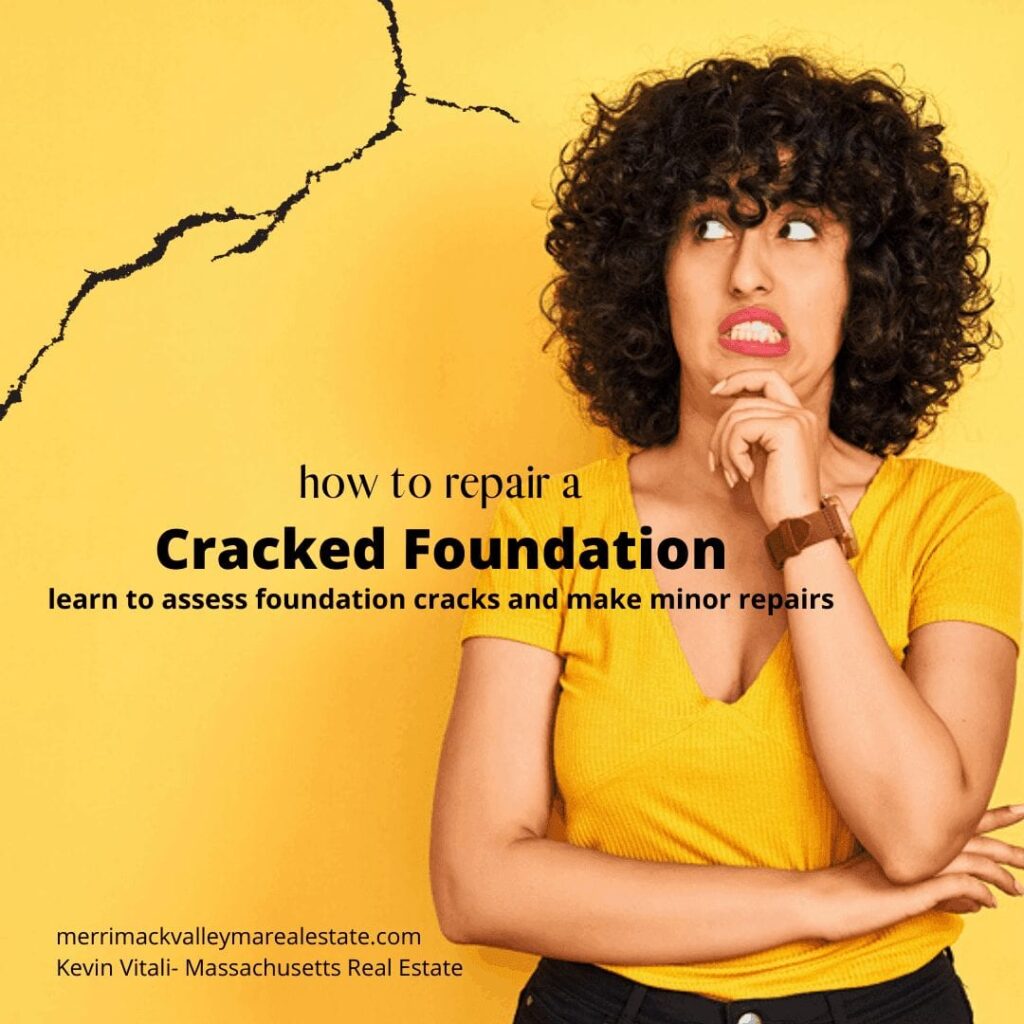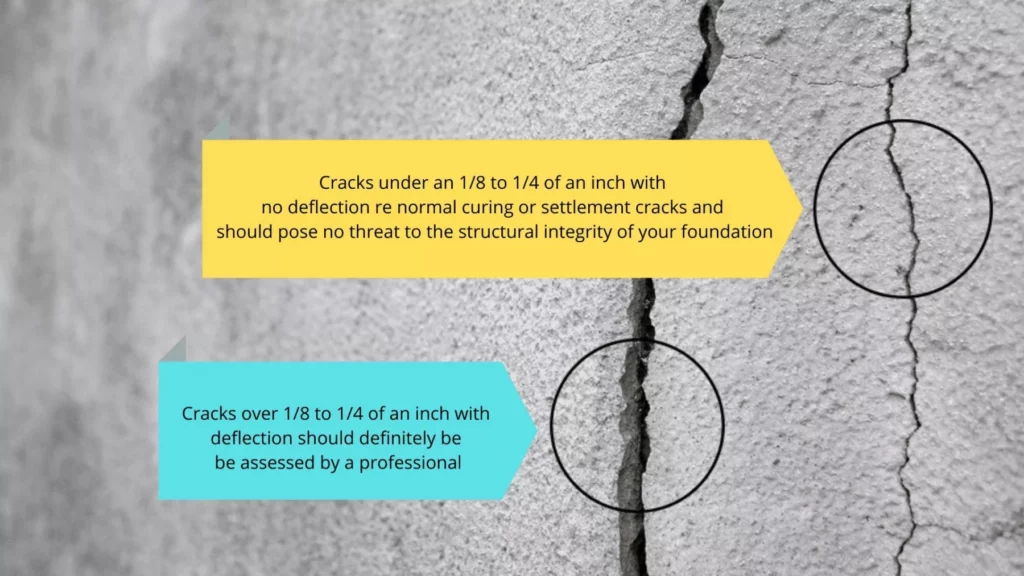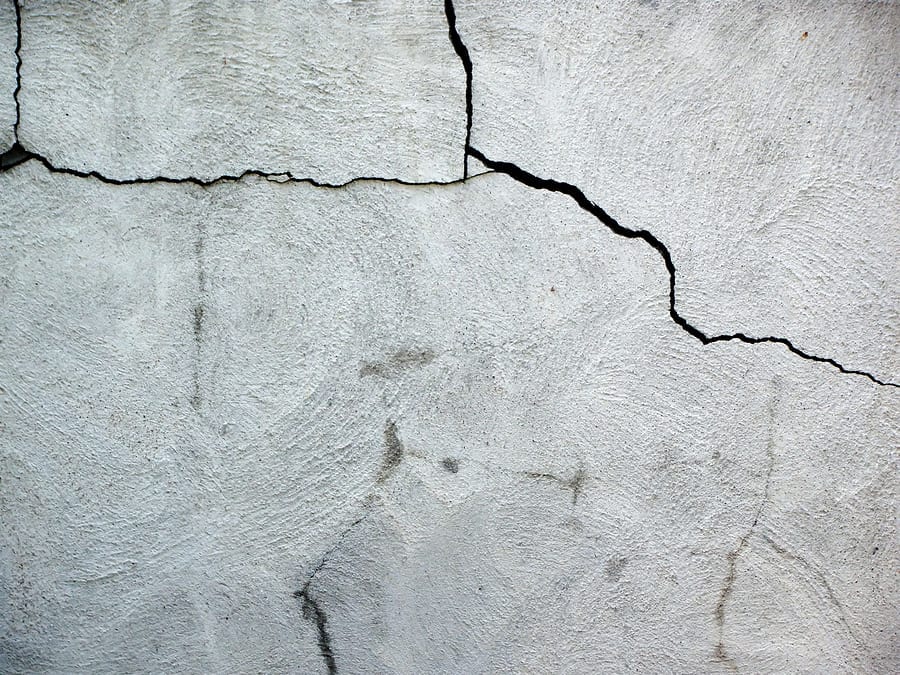
Often, foundation cracks are found when a home buyer performs their home inspection just before purchasing a home. This is one of the great reasons why you should not forgo your home inspection. A cracked foundation can be just a simple settlement crack or it can call out a bigger problem.
Assessing A Cracked Foundation
More often than not you are probably not looking at a very serious problem when you come across a foundation with cracks. It is very common for even new homes to get small settlement cracks shortly after being built.

What Direction Is The Crack Running?
Small foundation cracks that run vertically or diagonally are generally just settlement cracks. It is typical for concrete to shrink during the curing process. Settlement cracks are normal and are generally not a cause for concern.
Cracks that run horizontally are typically signs of a bigger issue and should be assessed by a foundation specialist or structural engineer. If horizontal cracks are accompanied by bulging and deflection, it is telltale of a problem you should take care of immediately.

Where Is The Foundation Crack?
Foundation cracks in the middle of the foundation wall, again, are very typical of a home settling. But if they are close to the corners you may want to have someone look at them to determine if there is a larger problem at hand.
The Size Of The Crack
Typically crack under an 1/8 to a 1/4 are not a big deal if they are running vertically or diagonally.
There is one other thing to look for though. Has the foundation wall on either side of the crack shifted either forward or back? Or, is the foundation bulging?
If there has been some deflection or bulging of the cracked foundation you may want to have someone look to see if the cracked foundation is a structural issue that needs to be addressed.
When Should I Have A Foundation Crack Professionally Repaired?
Anything other than simple hairline cracks up to 1/8 to a 1/4 of an inch that run vertically or less than 45 degrees diagonally is usually not a cause for concern.
Cracks that are larger or if there is deflection or bulging with the cracks are a cause for concern. Any horizontal cracks or cracks close to corners should be assessed as well.
If the problem is beyond some settlement cracking, you may need to look at what may be causing the cracking and solve that issue before repairing the foundation. Poor foundation drainage with the build-up of hydrostatic pressure is one problem that can cause an issue with the foundation.
Remember a foundation carries the whole weight of the house. If you have any questions about whether your foundation needs to be repaired or not, consult a professional.
Conducting Foundation Crack Repairs
Even if there are no serious issues created by a foundation crack you should consider filling your crack for a couple of reasons.
- Cracks that go all the way through the foundation can give radon a chance to find its way into the basement.
- Sealing a crack properly will help prevent earth, water or even insects from penetrating your home. It will also prevent radon gas from seeping through the cracks and building up in your home.
- Prevent any damage from water getting into the crack and freezing.
Two simple, inexpensive foundation crack repairs can include using hydraulic cement or a masonry caulk. These repairs tend to less permanent and will probably have to be done every couple of years.
Epoxy or Urethane Cracked Foundation Repair
An Epoxy or Urethane foundation repair is more costly and more involved but are definitely more permanent.
Epoxy is a good choice as it also adheres the concrete and can fix an minor movement of the concrete. An urethane repair will fill the crack but offers no structural fix.
If you are looking for a structural repair epoxy is the way to go. Consider cracks over an 1/8th of an inch or cracks that go all the way thru the foundation to be repaired with epoxy rather than urethane It is actually stronger than the concrete around it. If you are looking to fill a crack only to prevent penetration of the foundation than use urethane.
The cost of DIY foundation crack repair can run from a hundred to several hundred dollars depending on the product and the amount you need. Applied Technologies offers several different kits to fill and repair foundation cracks.
DIY Cracked Foundation Repair Process
The epoxy or urethane process is very similar to repair a cracked foundation.
- Clean the crack and about two inches behind. Make sure you are down to bare concrete. Use a wire brush and compressed air.
- Affix application ports with the epoxy at recommended intervals.
- Seal the outside of the crack with epoxy.
- Let epoxy cure.
- If the outside of the crack is exposed, seal the outside as well.
- Fill the crack with epoxy or urethane thru the ports. It can take up to five minutes at each port and go slow so it penetrates fully into the crack.
- After the epoxy cures cut off the ports.
Professional Foundation Crack Repair
If the process of filling and repairing a cracked foundation seems overwhelming or you are just unsure about what route to go hire a professional company like Crack-X to repair your foundation cracks.
A professional repair can cost between $300 to $1500. Most professional crack repairs will come with some sort of warranty that may be transferable to a new owner.
Cracks In A Concrete Floor
Just like foundation walls it is typical to get cracks in your basement floor. Your basement floor is a concrete slab and does not offer any structural integrity to your home.
Most concrete slab cracks are not an issue at all. Yet home buyers who are not understanding of a homes structure can be quite concerned.
While a crack in the concrete floor of your basement is really a non issue, you may consider sealing them to cut down on radon gas from seeping into the home. If your home has been tested and there is no concern than leaving the crack as is is fine.
Bottom Line
If you are viewing a home or having a home inspection done, cracks in a foundation wall and or floor does not immediately cause for concern. Your home inspector should tell you if further evaluation is necessary or if the crack is not an issue.
Almost 100% of all foundation walls or basement floors will have some minor cracking issues. If they are hairline cracks, monitor and see if they are worsening. If there is some gappingvto the crack consider a DIY repair or professional repair to prevent any water penetration.
If you are uncertain about the foundation crack and if it is more indicative of a bigger issue consider bringing in a professional.
Other Home Resources:
- If you are considering a home with well water don’t forget to do a radon test of the well water. Bill Gassett helps with his article on how to remove radon from your well water.
- What are some of the top issues you will find at a home inspection? Paul Sian provides us an infographic of the top 8 home inspection issues.
- Often issues arise during a home inspection. Anita Clark provides advice on negotiating home inspection issues with the home seller.
- Your best defense when buying a home is a good home inspection. Sharon Paxson tells us why the home inspection is important.
Kevin Vitali of EXIT Group One Real Estate has provided How to Perform a Cracked Foundation Repair. Kevin services Essex County and Northern Middlesex County in Massachusetts. Do you want the best buyer representation in Massachusetts you can get? Call Kevin at 978-360-0422.




